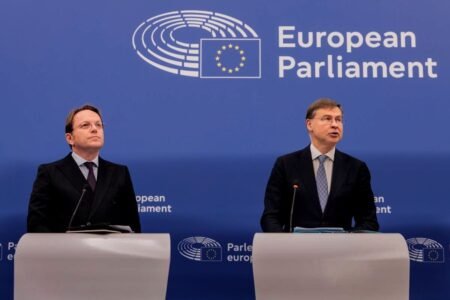The EU4Health programme came into force on 26 March, making EUR 5.1 billion available to strengthen the resilience of Europe’s health systems and promote innovation in the health sector.
Advertisement
What is EU4Health?
EU4Health is the fourth EU health programme, which will run from 2021-2027. It is the EU’s ambitious health response to the COVID-19 pandemic and the EUs overall health challenges. EU4Health will make 5.1 billion available over the next seven years to improve and foster health in the Union to reduce the burden of communicable and non-communicable diseases by:
- protecting people from serious cross-border health threats;
- improving the availability, accessibility and affordability of medicines, medical devices and other crisis relevant products in the EU;
- strengthening national health systems.
The EU4Health programme will go beyond the COVID-19 crisis, supporting amongst others actions on disease prevention, notably on cancer, the digital transformation of health systems, the reinforcement of the health system and the healthcare workforce. It will pave the way to a strong European Health Union that will improve and safeguard the health of all EU citizens.
What makes EU4Health different from previous health programmes?
Never before has Europe invested more in health. According to a recent EU survey, 66% of EU citizens would like to see the EU given more say over health-related matters. The pandemic has shown that the EU needs greater coordination during health crises and health-systems that are more resilient.
EU4Health is a stand-alone programme with a budget more than ten times that of previous health programmes. Actions like tackling cross-border health threats, making medicines available and affordable, and strengthening and digitalising health systems will be financially supported.
What are the main objectives of the EU4Health Programme?
The EU4Health programme has the following objectives:
- Improve and foster health in the Union by:
- Supporting actions for disease prevention, health promotion and addressing health determinants;
- Supporting global commitments and health initiatives.
- Protect people in the Union from serious cross-border threats to health by:
- Strengthening the capability of the Union for prevention, preparedness and response to cross-border health threats, including through a new bio-preparedness authority, the European Health Emergency Preparedness and Response Authority (HERA);
- Supporting actions complementing national stockpiling on essential crisis relevant products;
- Establishing a structure and training resources for a reserve of medical, healthcare and support staff.
- Enhance the availability, accessibility and affordability of medicinal products, medical devices and crisis-relevant products by:
- Encouraging sustainable production and supply chains and innovation in the Union, while supporting efficient use of medicinal products.
- Strengthening health systems resilience and resource efficiency though:
- Strengthening health data, the uptake of digital tools and services and the digital transformation of healthcare systems, including by supporting the creation of a European Health Data Space;
- Promoting the implementation of best practices and promoting data sharing;
- Enhancing access to quality, patient-centred, outcome-based healthcare and related care services;
- Supporting integrated work among Member States, and in particular their health systems.
How will non-communicable diseases, such as cancer, be addressed in the new programme?
Non-communicable and life style related diseases are among the biggest challenges facing EU health systems. Non-communicable diseases such as cardiovascular diseases, cancer, chronic respiratory diseases, and diabetes, represent major causes of disability, health-related retirement, and premature death in the Union, resulting in considerable social and economic costs. It is key to focus on prevention, combined with efforts to strengthen health systems in order to decrease the impact of non-communicable diseases on individuals and society and to reduce premature mortality towards reaching the Sustainable Development Goals by one third by 2030.
EU4Health will support disease prevention (including screening and early diagnosis for cancer) and health promotion programmes in Member States among others. EU4Health will contribute to the upscaling of the networking through the European Reference Networks, which are virtual networks and aim to facilitate discussion on complex, rare and non-communicable diseases, improving access to diagnosis and the provision of high-quality healthcare.
Will the programme contribute to the EU Beating Cancer Plan?
The pandemic has had a severe effect on cancer care, disrupting treatment, delaying diagnosis and vaccination, and affecting access to medicines. Even before the onset of COVID-19, cancer cases were estimated to increase by almost 25% by 2035, which will make it the leading cause of death in the EU. To reverse this worrying trend, the EU4Health Programme will also finance actions to fight cancer, which is one of the Commission’s main priorities. It will do so by providing funding to eligible legal entities established in Member States, such as health organisations and NGOs. Cancer will already be a strong priority in the first annual work programme for 2021, which will is expected to be adopted soon.
How will EU4Health address cross-border health threats?
The Commission is working to improve prevention, preparedness, surveillance and response to cross-border health threats. EU4Health can finance an EU reserve of medical, healthcare and support staff, and stockpiles of medical equipment.
Cross-border health threats require cross-border cooperation and the EU will play a larger role in supporting capacity and response. Beyond our own borders, the EU will support global cooperation on health challenges to improve health, reduce inequalities and increase protection against global health threats.
Will it also address shortages of medicines and personnel?
EU4Health can finance additional emergency reserves of medicines, medical devices and other health supplies to complement national reserves.
One way to make sure we have enough medical supplies is to use what we have more efficiently, in particular antimicrobials. Another way is to encourage European pharmaceutical production and innovation. EU4health will support the EU’s AMR Action Plan and the Pharmaceutical Strategy.
It will not be enough to have sufficient medicine and medical supplies. We also need a strong healthcare workforce, equipped with the necessary skills to face cross-border health threats. That is why EU4Health will also support healthcare workforce training in specific areas.
How will it improve health systems?
By making health systems more resilient, EU4Health will not only help prepare the EU to face future health crisis, but will also get Member States ready to face long-term challenges like an ageing population and health inequalities. Vulnerable groups need to have access to health services and healthcare, and inequalities between Member States and between regions in those Member States must be addressed.
When will the programme start?
Now adopted by the co-legislators, the EU4Health regulation will enter into force on the day of its publication in the Official Journal of the European Union and will apply retroactively from 1 January 2021. Next up is the preparation and adoption of the 2021 annual work programme, which is expected to prioritise crisis preparedness, disease prevention, health systems and digitalisation, as well as cancer as a transversal priority.
How much funding will be available under the EU4Health Programme and how will it be spent?
EU4Health will invest 5.1 billion over seven years to address health challenges. About 316 million are allocated to the first annual budget. Over its 7 year-lifetime, the programme will respect a number of provisions on total expenditure:
- a minimum of 20% for health promotion and disease prevention;
- a maximum of 12.5% for stockpiling crisis-relevant products at Union level;
- a maximum of 12.5% for supporting global commitments and health initiatives;
- a maximum of 8% for administrative expenses.
The programme should also contribute to mainstreaming climate action in the Union’s policies and the achievement of an overall expenditure target of at least 30% of the total amount of the Union budget and the EU Recovery Instrument on climate action.
How will EU4Health be implemented?
EU4Health will be implemented mainly by the Commission through direct management, including delegation to the executive agency. It will be implemented with eligible legal entities from Member States and third countries who will receive EU funding in the form of grants, prizes and procurement as well as indirect management by the relevant EU agencies such as European Medicines Agency or European Centre for Disease Control.
The new Health and Digital Executive Agency (HaDEA), that will be operational from 1 April, will be tasked with the roll-out and management of the annual work programmes.
The EU agencies – the European Centre for Disease Prevention and Control, and the European Medicines Agency – have a key role to play in Europe’s defence against serious cross-border health threats and pandemics, both on the prevention and on the crisis management front. The programme’s actions will enhance the work of these EU Agencies as well as of the European Food Safety Authority and the European Chemicals Agency.
To prepare the annual work programmes and monitor results, the EU4Health Regulation also sets up the consultative EU4Health Steering Group bringing together the European Commission and Member States. The Steering Group will be consulted on the annual priorities, contribute to ensure consistency and complementarity with Member States’ health policies, follow up the implementation of EU4Health and propose any necessary adjustments based on evaluations.
In addition, the Commission will consult with relevant stakeholders, including representatives of civil society and patient organisations, to seek their views on the needs to be addressed through the annual work programme, annual priorities and results.
The results of the stakeholder consultation and steering group discussions will be presented once a year to the European Parliament before the last Steering Group meeting.
Will the Commission continue to provide health funding through the European Social Fund + and other EU funds?
Whilst the EU4Health is the most ambitious health programme ever, important investments in health in the next long-term budget will also be made through other funding instruments working in synergy with EU4Health:
- the European Social Fund Plus (ESF+) to support vulnerable groups in accessing healthcare;
- the European Regional and Development Fund to improve regional health infrastructure;
- Horizon Europe for health research and innovation;
- rescEU to create emergency medical supplies;
- the Digital Europe Programme for creating the digital infrastructure needed for digital health tools;
- the Recovery and Resilience Facility for a stronger and more resilient EU from the current crisis.
Working across programmes and having shared objectives between policies will be key.
With the adoption of the EU4Health programme, the health strand of the proposal for the European Social Fund Plus (ESF+) is fully integrated into the EU4Health Programme.
How will the programme support research and innovation?
The EU4Health programme is an implementation tool for EU health policy and may support and encourage innovation regarding medicinal products and medical devices, and crisis-relevant products in the Union.
EU4Health will work closely with the European Commission’s main research programme, Horizon Europe, which includes a health cluster. Horizon Europe will finance research and innovation on topics such as life-long good health; environmental and social health determinants; non-communicable and rare diseases; infectious diseases; tools, technologies and digital solutions for health and care and healthcare systems. It will also include a Horizon Europe research & innovation mission on cancer, one of the Commission’s top priorities in health policy. The EU4Health Programme will help to ensure best use of research results and facilitate the uptake, scale-up and deployment of health innovation in healthcare systems and clinical practice.
Source: European Commission







